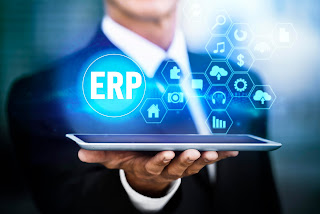"Unlocking Business Success with ERP Software: A Comprehensive Guide"
Introduction:
In today's fast-paced and competitive business landscape, organizations face numerous challenges to maintain efficiency, reduce costs, and stay ahead of the curve. Enterprise Resource Planning (ERP) software has emerged as a comprehensive solution to tackle these challenges by streamlining various business processes into a unified platform. This article explores the benefits, functionalities, and considerations of ERP software, emphasizing its crucial role in enhancing organizational performance and overall success.
1. What is ERP Software?
ERP software is an integrated suite of applications designed to facilitate and automate core business functions across an organization. It enables seamless data flow and real-time information exchange between departments, ensuring a unified view of the company's operations. ERP systems are customizable, allowing businesses to tailor them to their specific needs and industry requirements.
2. Benefits of ERP Software:
a. Improved Efficiency and Productivity: ERP solutions centralize data and processes, eliminating the need for manual data entry and reducing the risk of errors. By automating routine tasks, employees can focus on higher-value activities, leading to improved overall productivity.
b. Enhanced Decision-Making: With access to real-time data and analytics, ERP software empowers management to make informed decisions quickly. The availability of accurate, up-to-date information helps identify trends, anticipate challenges, and devise strategies accordingly.
c. Cost Savings: Although the initial investment in ERP implementation might be substantial, the long-term cost savings are significant. ERP streamlines operations, minimizes redundancies, and optimizes resource allocation, leading to reduced operational costs over time.
d. Better Customer Relationship Management (CRM): ERP systems often include CRM modules that enable businesses to manage customer interactions effectively. From sales and marketing to customer support, a comprehensive view of customer data allows companies to enhance customer satisfaction and loyalty.
e. Compliance and Data Security: ERP software helps organizations comply with industry regulations and data security standards. Centralized data management and access controls minimize the risk of data breaches and unauthorized access to sensitive information.
3. Core Functionalities of ERP Software:
a. Financial Management: ERP software enables businesses to manage their financial data efficiently, including general ledger, accounts payable, accounts receivable, and financial reporting. It streamlines financial processes, ensures accuracy, and provides insights for better financial planning.
b. Human Resources: ERP systems offer HR modules for managing employee data, payroll, attendance, performance evaluations, and recruitment. This streamlines HR processes, improves workforce management, and supports talent acquisition and retention efforts.
c. Supply Chain Management: ERP software optimizes the supply chain by providing real-time visibility into inventory levels, order status, and production schedules. This helps reduce lead times, minimize inventory costs, and improve overall supply chain efficiency.
d. Manufacturing and Production: ERP solutions assist manufacturers in planning, scheduling, and tracking production processes. By optimizing production workflows and resource allocation, businesses can increase output and reduce production bottlenecks.
e. Sales and Marketing: ERP systems often include CRM functionalities to manage sales leads, customer information, and marketing campaigns. This integration fosters better collaboration between sales and marketing teams, leading to more effective customer engagement.
4. Selecting the Right ERP Software:
a. Assess Business Needs: Before selecting an ERP system, conduct a thorough analysis of your organization's requirements. Engage key stakeholders to identify pain points, prioritize features, and establish clear objectives for ERP implementation.
b. Scalability and Flexibility: Choose an ERP solution that can scale with your business growth and adapt to evolving needs. Flexibility to customize the software ensures that it aligns perfectly with your unique business processes.
c. Integration Capabilities: Ensure that the ERP software can seamlessly integrate with existing systems and applications. This facilitates smooth data exchange between departments and prevents data silos.
d. User-Friendly Interface: An intuitive and user-friendly interface is crucial for successful ERP adoption. Employees are more likely to embrace the new system if it is easy to navigate and understand.
e. Vendor Reputation and Support: Research the reputation and track record of ERP vendors. Opt for a vendor with a strong history of successful implementations and excellent customer support.
Conclusion:
In conclusion, ERP software has emerged as an essential tool for modern businesses seeking to streamline their operations, enhance productivity, and achieve sustainable growth. The benefits of ERP, from improved efficiency and decision-making to cost savings and better customer relationship management, make it a crucial investment for organizations of all sizes and industries. By carefully assessing business needs and selecting the right ERP software, companies can unlock the full potential of this transformative technology and position themselves for long-term success in the dynamic and competitive marketplace.





Post a Comment